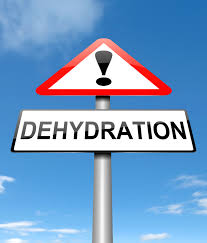|
It's New England- it gets hot.. and humid.. and the air is sometimes swamp-like. Does that mean you have to cancel your weekend hike plans or lose your registration in a local 5K? No, it just means you need to be safe, and prepared. I'm here to help with that.
First, a few (kind of scary) things that happen when you're dehydrated: -Losing 1% of your bodyweight in fluid causes your heart rate to jump 3-5bpm -Losing 2% of your bodyweight can seriously decrease any athletic performance -Cramping, fatigue, confusion, weakness -Serious cases can cause fainting, renal failure and can be fatal -Losing 8% can result in heat stress or illness -Losing 9-12% can be fatal Now that I've scared you; let me tell you what "dehydration" actually is and how to prevent it. Dehydration is essentially when your body loses more fluid (2% loss) than it takes in. Our bodies are made of 60% of water, and is how we regulate body temperature, how cells function, and how we break down the carbs, proteins and fats we eat. As you can see, water is extremely important to us, losing even 1% of our bodyweight through sweating has it's risks. HOW MUCH DO YOU SWEAT? The average adult exercising can lose 1-3.3 pounds of fluid per hour, athletes can lose up to 5.5 pounds per hour. This depends on a few factors; level of activity, heat index, and level of athleticism to name a few. A 150 pound person need only lose 3 pounds (2%) of fluid to be considered dehydrated. You might think 3 pounds is a lot, and there is no way you lose 3 pounds of fluid when you exercise- I promise you it is easier than you think. This is in non extreme conditions. When you add in either extreme environments (like 90 degrees or 80% humidity) or prolonged exercise (over 60 minutes) you'll lose even more! HYDRATE BEFORE, DURING, AFTER There are three stages I urge everyone to follow to decrease risk of dehydration, heat illness and heat stroke. Read, and please, make sure you take these into account. PRE-EXERCISE: 2-3 hours before: 17-20 oz of water 10-20 minutes before: 7-10 oz of water * No need for sports drinks prior DURING: <60 minutes: water only unless extreme conditions or improper hydration pre-exercise 60-90 minutes: electrolytes and water >90 minutes: Requires water, electrolytes and carb replenishments You'll want to consume 7-10oz every 10-20 minutes. If you're going for a sports drink:water combination check the label: ideally you'll want 14 grams of carbs, 100 grams of sodium and 25mg of potassium per 8oz. POST-EXERCISE Within the next 6 hours you'll want to replace your fluids and electrolyte levels to reduce dehydration risks and glycogen replacement. This part is tough and you'll have to guess at it unless you have the ability to weigh yourself before and after. You'll want drink 16-20 oz of fluid (water, electrolytes) for every pound lost during the workout. If you don't have access to a scale, just keep a water bottle and some sort of electrolyte drink with you the next few hours and listen to your body. I'm writing this because many of us either have a race this weekend or plan to run, hike, walk or play sports outside and I can't stress how important it is to stay hydrated for safety and performance reasons. HAVE FUN AND STAY SAFE! 5/17/2017 12:26:03 pm
Stack Xtreme towards you as opposed to for you.this is every other large misconception within the gym. the burning sensation that results from severe weight education is Stack Xtreme genuinely the result of lactic acid a metabolic waste product that is secreted in the muscle mass as you exercise. Comments are closed.
|
Categories
All
Author
|


 RSS Feed
RSS Feed